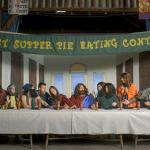
Communion is sacred. It’s one of two ordinances that Jesus explicitly commanded his followers to observe, the other being baptism. It’s a time for the Body to corporately remember Christ’s sacrifice, consuming the bread and wine (or, if you’re Baptist, grape juice), and thinking on his body and blood, broken and spilled out on the cross. It’s a time of fellowship, reflection and prayer. It’s a hallmark of Christian life.
I’ve participated in communion almost every month since I was young. I’ve grabbed the bread and wine from separate plates. I’ve removed the cracker from cellophane wrapping atop of a prepackaged cup of juice. I’ve dunked bread in a communal cup, and I’ve served juice to strangers at camp.
After about 30 years of participation, there are still lessons left to learn.
Today was the first Sunday of the month. For my church, and many others around the world, that means it was communion Sunday. It was initially just like any other Sunday. We took a break in the middle of service for the ushers to pass the plates, first the bread and then the juice. I waited for the ushers to get to us.
My son, 6, was sitting next to me. Because he’s so young and hasn’t made a profession of faith, we haven’t let him participate in communion. We’ve explained it to him and he’s been okay with it, but today he wanted to join in. As they passed the plate with the wafers down our row, he reached for one and I gently patted his arm and shook my head, no. “You’re not ready,” I whispered. I took my piece and returned the plate to the usher.
I glanced at my son, who sat next to me with a dejected look on his face, tears brimming in his eyes. This wasn’t a look of petulance or anger. It was embarrassment and hurt. He’d wanted to join in and be part of something, and been refused. He was isolated, told he wasn’t a part of it all.
Now, a clarification: I understand that there is an “in and out” component to communion. It’s a practice only for believers. Those who do not share our faith and have not put their trust in Christ are not expected to participate; in some churches I’ve attended, the pastors explicitly ask non-believers to abstain. We had briefly considered serving communion at our wedding and then decided against it because not everyone could participate. As I’ve heard it explained, communion is a sermon preached by the body. It’s our corporate acting out of our faith.
But what does that mean? My son is 6, but he knows who Jesus is. He asks questions all the time. We’ve discussed sin, and Christ’s death and resurrection. He knows that we only hope in Heaven because of what Christ did on the cross. He often brings up the topic of people knowing God and asks questions that amaze me with their depth. Am I putting restrictions on communion that the Bible never intended? Am I telling him that childlike faith isn’t valid, that it’s not enough to earn him a place at the table?
But he hasn’t prayed The Prayer, I argued with myself. And I twinged. I was his age when I prayed the Sinner’s Prayer, asking Jesus “into my heart.” I was responding to an AWANA message. I wasn’t a kid interested in spiritual things before that, not the way Mickey is. Was I elevating myself 6-year-old self over my son just because I’d said a simple prayer? Were those words magic? At that point, did I even understand a fraction of what my son does?
In those few moments, I began to reflect on the nature of faith. Is saving faith only saving faith if you pray a magic prayer? Or is it belief that evolves and deepens as you grow older? If my little prayer to ask Jesus into my heart (a phrase I’ve come to detest) was just the simple first step in a belief that would turn into something larger down the road, weren’t my son’s curious questions similar? Was I being a gatekeeper as to what constituted real faith, a position only God should hold? And if my son desired to join in with the corporate body, would telling him “you’re not a part of this” squelch that faith?
And so, I broke my small wafer in half and handed it Mickey. I knelt down next to him and whispered “we do this because when we eat it we remember what Jesus did for us.” I did the same with the juice. We shared in communion together and his crestfallen look changed to pride. Later this afternoon, we talked more about communion, sin, Christ’s death and faith. I don’t know how much of this he has all put together, but I know he’s interested and wants to know more. We consider “mustard-seed faith” to be grown-up faith that’s shrunken under doubt. But what if it can also apply to children’s faith that just doesn’t have the capacity to know much more than “Jesus loves me”? What if those three simple words are just as beautiful and deep a profession of faith as our florid confessions and poetic liturgies?
I gave my son a practical lesson in communion today, but I wasn’t prepared for how much I had to learn about my own faith. I saw my own ingrained legalism and self-righteousness but also gained a deep appreciation for my son’s curious, budding belief. For the first time, my boy and I observed the Lord’s Supper together. He got to be part of it. And few things give a father so much joy.













